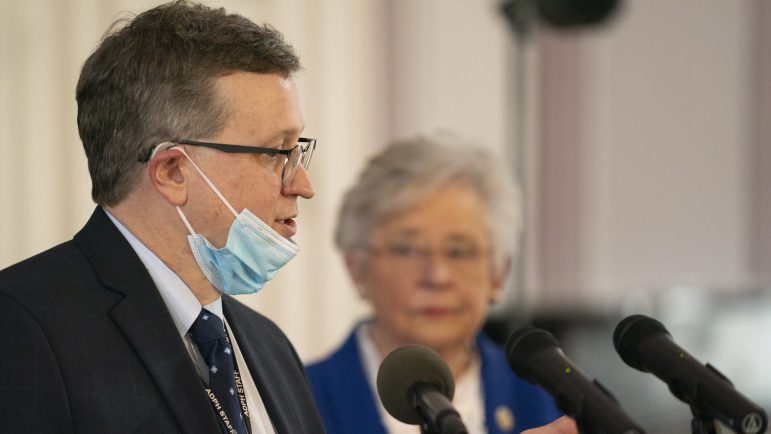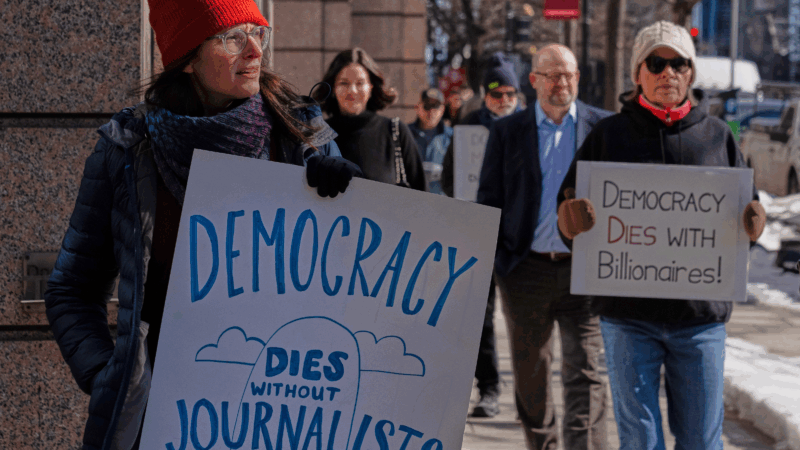Frustration Grows With Alabama’s Slow Vaccine Rollout
Alabama health officials have faced mounting criticism this week about the slow rollout of COVID-19 vaccines. The state ranks near the bottom nationwide in per capita vaccinations and it has administered less than half of available doses. That has left people around the state frustrated and confused.
Moving At Different Speeds
At the Auburn University Medical Clinic, director Dr. Frederick Kam said when the clinic got its first and only shipment of COVID vaccines a few weeks ago, it was a surprise.
“We did not know that it was arriving that morning,” Kam said.
He and his staff stopped everything and got to work.
“It took a lot of quick phone calls, multiple phone calls, some emails and coordination, so that we could start, literally, injecting people that afternoon,” he said.
The university received 3,500 doses to vaccinate people on campus. Without a large hospital or a significant elderly population, the clinic adapted state eligibility criteria to administer its allotment.
While most places in Alabama are offering vaccines to people aged 75 and up, Auburn is vaccinating people 65 and older. It is also giving doses to faculty and students with underlying health conditions.
“We’re probably moving more rapidly than the state’s laid out phases,” Kam said, “but still within the spirit and intent of protecting people at high risk.”
It is normal for clinics and hospitals to move at different speeds as they deliver vaccines, according to Claire Hannan, director of the Association of Immunization Managers, a nonprofit that includes representatives from state health departments.
“Who they vaccinate is kind of based on how many doses they have,” Hannan said. “So you see some counties and some states opening it up to more people earlier because they don’t want vaccine to sit on the shelf. So that can be confusing.”
Supply, Demand, Confusion
In Alabama, some doses have been sitting on the shelf, prompting recent action by the Alabama Department of Public Health (ADPH). The department announced this week that it will redistribute vaccine doses that are not used within a certain timeframe.
Still, many people are frustrated.
Earlier this week, four state lawmakers, including state Sen. Jim McClendon, released a public letter asking why vaccinations are moving slower in Alabama than almost anywhere else.
McClendon said he has tried to learn more from state health officials.
“I never could get an answer,” he said, “or understand the answer to explain why we’re not doing a good job.”

ADPH officials have repeatedly said supply is the issue, yet as of Thursday evening, more than half the state’s vaccine doses remain unused.
State health officer Dr. Scott Harris said those vaccines might not have been administered yet, but they are reserved, mostly for those awaiting second doses.
He said most hospitals have used all of their allotment and are waiting for more, but the state receives a limited supply from the federal government every week — 50,000 to 60,000 doses — a number Harris doesn’t expect to change anytime soon.
Harris said he understands the frustrations.
“People certainly have a right to expect that we could do things faster,” he said during a press conference Thursday. “I think we can also do things faster, and so we have several things that we’re implementing to make sure that happens.”
He said county health departments are working to vaccinate people “all day, every day.” He also said Alabama will soon partner with Walmart pharmacies to help administer vaccines, though no start date has been announced.
Lack Of Guidance
While Alabama stands out nationally, many places across the country are struggling with the rollout. Tom Denny, CEO of the Duke Human Vaccine Institute, said federal officials are mostly to blame.
“I think the flaw was that planning was left to states and individual municipalities, or areas, to do this,” Denny said. “And, you know, some things are best done locally, but they need resources to do it.”
He said states have not gotten enough resources or guidance from the federal government. And health departments and hospitals have been busy handling the pandemic.
Denny is hopeful that the Biden administration will speed things up and offer more assistance.
For now, Alabama health officials said they are doing the best they can.
Pentagon says it’s cutting ties with ‘woke’ Harvard, ending military training
Amid an ongoing standoff between Harvard and the White House, the Defense Department said it plans to cut ties with the Ivy League — ending military training, fellowships and certificate programs.
‘Washington Post’ CEO resigns after going AWOL during massive job cuts
Washington Post chief executive and publisher Will Lewis has resigned just days after the newspaper announced massive layoffs.
In this Icelandic drama, a couple quietly drifts apart
Icelandic director Hlynur Pálmason weaves scenes of quiet domestic life against the backdrop of an arresting landscape in his newest film.
After the Fall: How Olympic figure skaters soar after stumbling on the ice
Olympic figure skating is often seems to take athletes to the very edge of perfection, but even the greatest stumble and fall. How do they pull themselves together again on the biggest world stage? Toughness, poise and practice.
They’re cured of leprosy. Why do they still live in leprosy colonies?
Leprosy is one of the least contagious diseases around — and perhaps one of the most misunderstood. The colonies are relics of a not-too-distant past when those diagnosed with leprosy were exiled.
This season, ‘The Pitt’ is about what doesn’t happen in one day
The first season of The Pitt was about acute problems. The second is about chronic ones.






